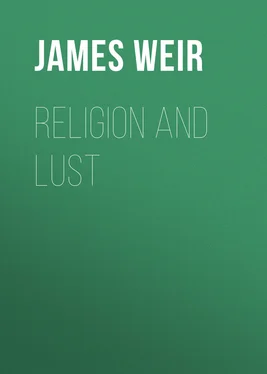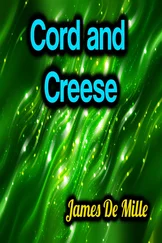James Weir - Religion and Lust
Здесь есть возможность читать онлайн «James Weir - Religion and Lust» — ознакомительный отрывок электронной книги совершенно бесплатно, а после прочтения отрывка купить полную версию. В некоторых случаях можно слушать аудио, скачать через торрент в формате fb2 и присутствует краткое содержание. Жанр: psy_sex_and_family, psy_sex_and_family, Эротика, Секс, Детская образовательная литература, Детская образовательная литература, на английском языке. Описание произведения, (предисловие) а так же отзывы посетителей доступны на портале библиотеки ЛибКат.
- Название:Religion and Lust
- Автор:
- Жанр:
- Год:неизвестен
- ISBN:нет данных
- Рейтинг книги:4 / 5. Голосов: 1
-
Избранное:Добавить в избранное
- Отзывы:
-
Ваша оценка:
- 80
- 1
- 2
- 3
- 4
- 5
Religion and Lust: краткое содержание, описание и аннотация
Предлагаем к чтению аннотацию, описание, краткое содержание или предисловие (зависит от того, что написал сам автор книги «Religion and Lust»). Если вы не нашли необходимую информацию о книге — напишите в комментариях, мы постараемся отыскать её.
Religion and Lust — читать онлайн ознакомительный отрывок
Ниже представлен текст книги, разбитый по страницам. Система сохранения места последней прочитанной страницы, позволяет с удобством читать онлайн бесплатно книгу «Religion and Lust», без необходимости каждый раз заново искать на чём Вы остановились. Поставьте закладку, и сможете в любой момент перейти на страницу, на которой закончили чтение.
Интервал:
Закладка:
James Weir
Religion and Lust / or, The Psychical Correlation of Religious Emotion and Sexual Desire
PREFACE TO FIRST EDITION
The author of this monograph has been incited to its publication by the commendations of three of the most eminent critics and editors of magazines in the United States, to whom it was submitted in manuscript. In this essay, he discusses his subject from a physio-psychical standpoint, and believes that he has kept intact the canons of scientific investigation, observation, and discussion.
“Waveland,” June 8, 1897.
PREFACE TO SECOND EDITION
In preparing The Psychical Correlation of Religious Emotion and Sexual Desire for its second edition, the author has incorporated in it a considerable amount of additional evidence in support of his theory. He has carefully verified all references; he has endeavored to eliminate all unnecessary material; and, finally, he has changed the style of the work by dividing it into three parts, thus greatly simplifying the text. He feels under many obligations to his critics, both to those who thought his little book worthy of commendation, and to those who deemed his premises and conclusions erroneous. He feels grateful to the former, because they have caused him to believe that he has added somewhat to the literature of science; he thanks the latter, because in pointing out that which they considered untrue, they have forced him to a new and more searching study of the questions involved, thereby strengthening his belief in the truthfulness of his conclusions.
To the second edition of The Psychical Correlation of Religious Emotion and Sexual Desire, the author has seen fit to add certain other essays. In preparing these essays for publication, he has borrowed freely from his published papers, therefore, he desires to thank the publishers of the New York Medical Record, Century Magazine, Denver Medical Times, Charlotte Monthly and American Naturalist for granting him permission to use such of his published material (belonging to them) as he saw fit.
The author asks the indulgence of the reader for certain repetitions in the text. These have not been occasioned by any lack of data, but occur simply because he believes that an argument is rendered stronger and more convincing by the frequent use of the same data whenever and wherever it is possible to use them. When this plan is followed, the reader, so the author believes, becomes familiar with the author‘s line of thought, and is, consequently, better able to comprehend and appreciate his meaning.
Finally, the author has been led to the publication of these essays by a firm belief in the truthfulness of the propositions advanced therein. He may not live to see these propositions accepted, yet he believes that, in the future, perhaps, in worthier and more able hands, they will be so weightily and forcibly elaborated and advanced that their verity will be universally acknowledged.
“Waveland,” September 17, 1897.
PREFACE TO THIRD EDITION
The author, after mature consideration, has thought it advisable to confine the subject matter of the Third Edition of Religion and Lust almost wholly to the psychical correlation of religious emotion and sexual desire. He has eliminated certain of the psychical problems embraced in the First and Second Editions and has added instead a bibliography. The student, he thinks, will find these changes of value, especially in the matter of reference. The author has also added certain data to the thesis of the work, as well as foot-notes; which, he thinks, will strengthen the deductions and conclusions therein enunciated. He has carefully and conscientiously edited and verified all notes and quotations to be found in the book and rests satisfied in the conviction that, whatever may be lacking in his little volume, it will not be “the truth, the whole truth, and nothing but the truth.”
“Waveland,” Owensboro, Ky., Feb. 25, 1905.
CHAPTER I.
THE ORIGIN OF RELIGIOUS FEELING
I believe that man originated his first ideas of the supernatural from the external phenomena of nature which were perceptible to one or more of his five senses; his first theogony was a natural one and one taken directly from nature. In ideation the primal bases of thought must have been founded, ab initio , upon sensual perceptions; hence, must have been materialistic and natural. Spencer, on the contrary, maintains that in man, “the first traceable conception of a supernatural being is the conception of a ghost.” 1 1 Spencer: Principles of Sociology , vol. i, p. 281.
Primitive man’s struggle for existence was so very severe that his limited sagacity was fully occupied in obtaining food and shelter; many thousands of years must have passed away before he evolved any idea of weapons other than stones and clubs. When he arrived at a psychical acuteness that originated traps, spears, bows and arrows, his struggle for existence became easier and he had leisure to notice the various natural phenomena by which he was surrounded. Man evolved a belief in a god long before he arrived at a conception of a ghost, double, or soul. He soon discovered that his welfare was mainly dependent on nature, consequently he began to propitiate nature, and finally ended by creating a system of theogony founded on nature alone. 2 2 “Theology and religion are of service in morals and conduct in direct proportion as they have become adapted to our knowledge of natural phenomena”—Lydston: The Diseases of Society , p. 68.
“It is an evident historical fact that man first personified natural phenomena , and then made use of these personifications to personify his own inward acts, his psychical ideas and conceptions. This was the necessary process, and external idols were formed before those which were internal and peculiar to himself.” 3 3 Tito Vignoli: Myth and Science , p. 85.
Sun, moon, and star; mountain, hill, and dale; torrent, waterfall, and rill, all became to him distinct personalities, powerful beings, that might do him great harm or much good. He therefore endeavored to propitiate them, just as a dog endeavors to get the good will of man by abjectly crawling toward him on his belly and licking his feet. There was no element of true worship in the propitiatory offerings of primitive man; in the beginning he was essentially a materialist—he became a spiritualist later on. Man’s first religion must have been, necessarily, a material one; he worshiped (propitiated) only that which he could see, or feel, or hear, or touch; his undeveloped psychical being could grasp nothing higher; his limited understanding could not frame an idea involving a spiritual element such as animism undoubtedly presents. Apropos of the dream birth of the soul, all terrestrial mammals dream, and in some of them, notably the dog and monkey, an observer can almost predicate the subject of their dreams by watching their actions while they are under dream influence; yet no animal save man, as far as we know, has ever evolved any idea of ghost or soul. 4 4 Clarke in his interesting book gives us some very readable stories anent the ability of animals seeing imaginary objects. I myself have seen a parrot with a marked case of delirium tremens , due to excessive use of alcoholic stimulants (Vid. Author: The Dawn of Reason ). Romanes also gives valuable data in his Mental Evolution (in Animal, and in Man) concerning this subject. The fox terrier (Vid. Author: Dawn of Reason ) which carried his dreams into his awakened state is apropos.
It may be said, on the other hand, that since animals show, unmistakably, that they are, in a measure, fully conscious of certain phenomena in the economy of nature, and while I am not prepared to state that any element of worship enters into their regard, I yet believe that an infinitesimal increase in the development of their psychical beings would, undoubtedly, lead some of them to a natural religion such as our pithecoid ancestors practiced.
Интервал:
Закладка:
Похожие книги на «Religion and Lust»
Представляем Вашему вниманию похожие книги на «Religion and Lust» списком для выбора. Мы отобрали схожую по названию и смыслу литературу в надежде предоставить читателям больше вариантов отыскать новые, интересные, ещё непрочитанные произведения.
Обсуждение, отзывы о книге «Religion and Lust» и просто собственные мнения читателей. Оставьте ваши комментарии, напишите, что Вы думаете о произведении, его смысле или главных героях. Укажите что конкретно понравилось, а что нет, и почему Вы так считаете.












